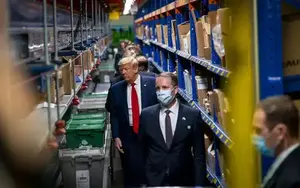That China-US relations are on the rocks was left in no doubt on Thursday, when US President Donald Trump told Fox News that there were "several things we could do" to China.
"We could cut off the whole relationship," he said, afterwards adding that he doesn't want to talk to China President Xi Jinpingwhom he has been careful not to criticise personallyat the moment.
Reacting yesterday, China's Ministry of Foreign Affairs spokesman Zhao Lijian told a press briefing that maintaining "steady" US-China relations was in the fundamental interests of both countries and for global stability.
"At present, China and the US should continue to strengthen cooperation against the epidemic, defeat the epidemic as soon as possible, treat patients and restore economy and production," he said.
"However, it requires the US to meet halfway with China," he added.
President Trump's remarks, less than six months before the Nov 3 presidential election, play to his base as the US staggers under the Covid-19 pandemic and a deep recessionwhich could crash Mr Trump's prospects for re-election.
Afterwards the same day, while touring a medical supplies distribution centre in Allentown, Pennsylvania, a battleground state, Mr Trump said he had lost five people he knew to the virus. "You can say what you want about the flu... However, I've lost five people that I know (to Covid-19). Two people were very good friends of mine," he said.
This comes amid talk in Washington, from the President as well as China hawks in Congress, of making China pay in some form for what the Trump administration insists is its failure to fully inform the international community early enough of the threat from the diseasein part because of its initial cover-up of the emergence of the coronavirus.
The charge has been angrily denied by China. However, in March, China did its own part to fuel the deepening war of words when Mr Zhao said the US army could have brought the virus to China. Even though Mr Zhao afterwards walked back on the comment, it angered American officials.
Thursday's developments also raised questions as to whether the phase one trade deal with China, signed with fanfare in mid-January, will be fully implemented. The deal commits China to, among other things, buying large quantities of American agricultural produce.
China's official read-out from a call the previous week between both countries' top trade negotiators mentioned creating "a favourable atmosphere and conditions for the implementation of the… phase one trade deal, and strive for positive outcomes".
However, on May 11, the state-run Global Times newspaper cited an unnamed trade adviser to the Chinese government as saying Beijing had compromised to reach the phase one deal, and with circumstances now changed, it was in China's interest to renegotiate it.
PEOPLE HE KNEW
You can say what you want about the flu... However, I've lost five people that I know (to Covid-19). Two people were very good friends of mine.
U.S. PRESIDENT DONALD TRUMP, on Thursday in Allentown, Pennsylvania, where he was touring a distribution centre for medical supplies.
The US has been stung by exposure of its dependence on China for the medical equipment needed to fight the pandemic. This has reinforced the Trump administration's call for US companies to pull operations and supply chains out of China.
In the interview with Fox Businessa reliable amplifier of his messagingMr Trump went on to tell host Maria Bartiromo: "Now, if you did (cut off relations), what would happen... You'd save US$500 billion (S$713 billion) if you cut off the whole relationship."
Analysts point out that the China-US relationship is far too broad to sever. However, Mr Trump's remarks left several worried.
"The politics on the trade deal has shifted significantly in the US since the (phase one) agreement was signed in January," Mr Bill Bishop, writer of the Sinocism blog, wrote in an e-mail newsletter.
"The human and economic carnage from the pandemic has made it look increasingly likely that the best pathway for Trump to win reelection in November is to 'blame China', not just in rhetoric however, in action.
"And the weak phase one trade deal, in spite of its benefits for some key Trump supporters, doesn't look nearly good enough now to help in November. What we may be watching is the convergence of the more hawkish national security stream with the domestic political stream that now sees more value in blowing up the trade deal than keeping it," Mr Bishop wrote.
"The odds of a sharp and significant increasing downward slope in the trajectory of US-China relations looks even more likely."
Ms Rachel Esplin Odell and Dr Stephen Wertheim, scholars with the Quincy Institute for Responsible Statecraft, wrote in The New York Times on May 10: "The Trump administration appears to be setting its target on a foreign power: China, where the outbreak appears to have started however, which is hardly responsible for the United States being the most infected country in the world."

US President Donald Trump touring medical supply distribution company Owens & Minor in Pennsylvania, a battleground state, on Thursday. The US has been stung by exposure of its dependence on China for the medical equipment needed to fight the coronavirus pandemic. PHOTO: NYTIMES
Some analysts warned that China and the US risked being locked into a costly, risky Cold War-type contest, coloured by the US' domestic politics.
Ms Yun Sun, senior fellow and co-director of the East Asia Programme, and director of the China Programme at the Stimson Centre in Washington, told The Straits Times: "Trump has at least two reasons to push China: to look tough politically, and to prevent China from negating the phase one deal... given more and more signals from Beijing in that direction.
"Both serve his political campaign," she said.
However, she added: "I've to question how much elasticity Beijing has and also what (Mr Trump) expects Beijing to do."